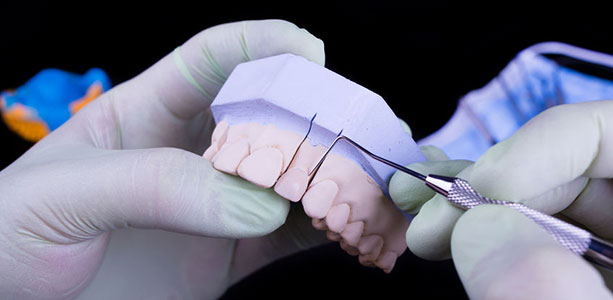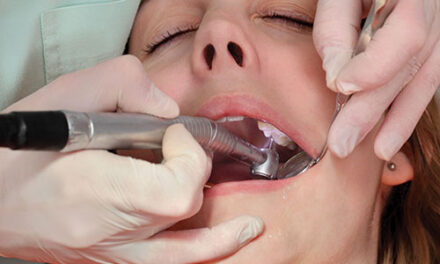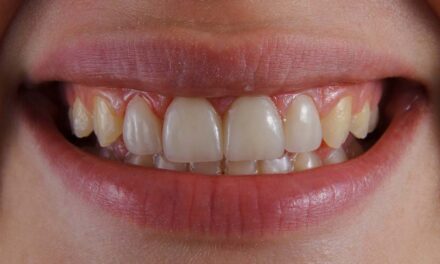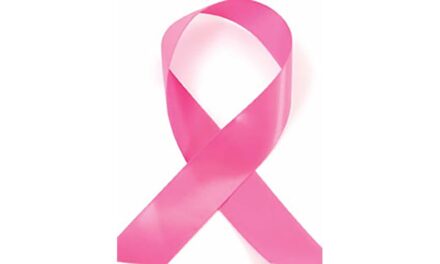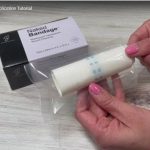A toothless face is not a pretty site. If you’re worried about aging and ending up with sunken cheeks and dentures, read on. Most people assume once you become a senior, loosing your teeth is inevitable. Tooth loss is common, but in majority of the cases, just like most things in life, if you loose your teeth and end up with false teeth, you’re probably the cause.
Baby teeth fall out on their own to be replaced with adult permanent teeth. However, adult teeth don’t fall out from natural causes. Disease or trauma are usually the culprits for adult teeth dying.
Trauma and Tooth Loss
Obviously, a severe blow to the face can knock out your teeth or severely damage them. This is commonly the result of sports such as baseball, football or boxing. The more intense the trauma, the more likely for the tooth to be damaged beyond repair and therefore lost.
Other forms of trauma can be the result of using your teeth as a tool. Opening bottle caps, holding pins, tearing bags, or cracking ice cubes are only a few examples.
Habits can also be traumatic to your teeth. Holding a tobacco pipe with your teeth for long periods of time, chewing pencils or pens, biting fingernails, holding onto paper clips or other objects and clenching or grinding the teeth are a few that come to mind.
Clenching and grinding the teeth can put more than 800 pounds of pressure on your teeth. This obviously may lead to fractures and tooth loss. If you know you clench or grind, ask your dentist for a mouth guard to help protect your teeth. Approximately seventy percent of the time, mouth guards can help break your habit as well.
Disease and Tooth Loss
If you lose your teeth from disease, it could be from two causes. Disease can involve the teeth and gums directly, such as periodontal disease due to poor oral hygiene, or it may be from a systemic origin. Let’s take a closer look at both instances.
Myth Busters About Gum Disease
Periodontal disease (gum disease) doesn’t start full blown and advanced causing serious damage to your mouth. It’s known as the silent disease because it can sneak up on you. Before you know it, the signs you ignored destroy bone resulting in tooth loss.
The initial signs can start with slight bleeding when you brush. Unfortunately, most people think if you have some bleeding gums, it’s normal. Nothing could be further from the truth! Just imagine if you brushed your hair and it started to bleed. This would be cause for alarm. Same with your teeth and gums. Any bleeding while brushing or flossing, is a sign of inflammation.
Inflammation is a serious symptom of disease. In the mouth, inflammation, which causes swelling and redness of the gums, can eventually destroy the supporting tissues what hold the teeth in place.
Dentists call the initial stage of gum disease gingivitis. Mild gum bleeding while brushing, flossing and bad breath are usually the noticeable signs at this point. If you ignore this stage, which is very reversible, the disease becomes more advanced and you eventually loose your teeth. As the disease advances, so do the signs and symptoms:
- Tissue becomes more red and swollen
- Gums bleed easier
- Gums appear to separate from the teeth
- Teeth become loose
- Bad breath becomes more frequent
Preventing gum disease is not difficult, if it’s not due to a systemic illness or medications that have to be taken. Regular check ups and a daily, proper home hygiene routine will prevent gum disease.
Besides gum disease, systemic disease can also seriously cause problems to the teeth and gums, and eventually tooth loss. Chronic illness such as diabetes, cancer, osteomyelitis, and autoimmune diseases, can result in tooth loss.
These types of illness all affect the health of the mouth differently. For example, tooth loss in people with diabetes may be associated with gum tissue being more susceptible to infection due to the body’s slower ability to fight infection. Cancer therapy, especially head and neck radiation can cause tooth loss. Osteomyelitis treatment with bisphosphonate has been shown to cause what is called osteonecrosis of the jaw (ONJ) or jaw death and tooth loss.
It’s not necessarily a fact that certain systemic diseases will cause tooth loss. But they do predispose the mouth with the conditions that could cause tooth loss. With more frequent dental check ups and proper home oral hygiene, you don’t have to loose your teeth, even while undergoing head and neck radiation.
Other Causes of Tooth Loss
Besides systemic disease and local disease from poor oral hygiene, there are other causes of tooth loss:
- Smoking
- Recreational drugs
- Hormonal changes
- Excessive alcohol
- Poor nutrition
- Certain prescription medications
The causes listed above are indirect reasons for tooth loss. Most people that smoke don’t realize vital nutrients are being depleted from the tissues making it difficult to maintain healthy gums. This leaves the tissues easy to break down and become inflamed.
Recreational drug users may binge on sugary foods and neglect their oral hygiene. Certain prescription drugs dry the mouth, which makes the oral environment acidic and more conducive for harmful bacteria to thrive and cause damage.
Fluctuating hormones during pregnancy may affect how a woman responds to disease. Gum tissue will be more likely to respond quickly to poor oral hygiene in a negative way. Poor nutrition, including an excessive sweet tooth, will promote tooth decay and tooth loss. The following are types of acid forming foods that harmful bacteria use to destroy teeth.
- Red meat
- White bread
- Candy or high sugar foods
- Carbonated sweet drinks
- Eating at night
Eating at night before bedtime can be a real problem. Saliva is reduced while you sleep, which produces a dry mouth that bacteria love. With a dry oral environment, it’s easy for bacteria to convert food to acid, especially if you ate fermenting foods such as pasta, white bread or meat.
Any disabilities, whether age related or developmental, will present challenges to home care and maintaining healthy teeth and gums. Depending on the level of disability, a simple power toothbrush may do, or in severe cases, a caretaker can help with home oral hygiene care.
What happened to aging and tooth loss?
As you can see, in all the causes for tooth loss mentioned above, old age has not been mentioned. No matter your age, your teeth can be healthy and/or you could lose your teeth at any age.
Studies reveal gum disease is the main cause, in majority of the cases, for tooth loss in seniors. And in most instances, gum disease is the result of not taking good care of your mouth with regular, daily brushing and flossing. With complete dentures, the facial features do change. The cheeks look sunken but more importantly, chewing food will never be the same. Even with the best fitting dentures, acrylic teeth on an acrylic base will not quite feel as secure as your own teeth. Implants are an option, but not everyone can afford or have adequate, healthy bone needed for this procedure. The best answer for preventing tooth loss is regular check ups and proper home oral hygiene. Just two to three minutes a day, especially at bedtime, can keep you and your teeth smiling for a lifetime.

